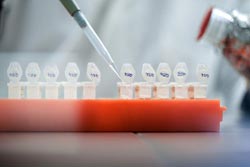Floragenex and Thünen Institute announce collaboration on African and Asian tree genomics

Thünen Institute and Floragenex will cooperate to identify natural genetic variation in tropical tree species (© Ilja Hendel)<br>
Under the agreement, Floragenex will use Restriction site Associated DNA (RAD) sequencing technology in conjunction with the Illumina HiSeq 2000 platform to identify natural genetic variation in five distinct species of trees distributed in a geographic range across Africa and Central Asia.
Genomic DNA for selected Iroko, Sapeli, Ayous, Sibirian larch, and Mongolian oak trees will be provided by the Thünen Centre of Competence on Timber Origin and sent to Floragenex laboratories for RAD library processing, sequencing and bioinformatics analysis of genomic data. The so generated genomic information will be used by the Thünen Institute to develop gene markers to identify species and to control the geographic origin of timber. The gene markers will be applied by Thünen as re-enforcement tools to control the timber trade and to reduce illegal logging.
“We are pleased to continue our long-running relationship with the Thünen Institute and advance genomics efforts in these important and understudied tree species” said Floragenex President Rick Nipper. “Floragenex’s commitment to work in ecological and conservation genomics is a key mission of our business and we look forward to providing the Thünen Institute with substantial genomic resources for both future basic and applied research.”
“It is a great opportunity to work together with Floragenex”, said the Director of the Thünen-Institute of Forest Genetics, Bernd Degen. “The genomic data produced by the RAD approach of Floragenex will offer a massive amount of gene markers for our timber tracking projects”.
About Floragenex
Oregon-based Floragenex is a privately owned biotechnology company providing innovative solutions for genomic analysis in human, plant and animal systems. Since 2007, Floragenex has delivered impact results in hundreds of genomics studies focused on answering fundamental questions in genetics, ecology, evolutionary biology and biomedical research. With multiple offices located on the US Pacific coast, Floragenex technologies permit investigation of genomes at unprecedented levels for academic, governmental and commercial researchers worldwide.
About the Thünen Institute
The German Thünen Institute conducts interdisciplinary research targeted at the sustainable development of agricultural, forestry and wood production as well as fisheries. The work encompasses economic, ecological and technological aspects. As a federal research centre consisting of 15 specialised institutes, it develops scientific basics as decision-making for the German government.
Within the Thünen Institute, the Thünen Centre of Competence on the Origin of Timber is the central contact facility for government agencies, timber trade, consumers and associations to verify the species of wood and/or wood products and its origin in Germany. The Centre combines the analytical expertise and competence of the four Thünen institutes of Wood Research, Forest Genetics, World Forestry and Forest Economics responsible for wood identification, proof of origin, certification and timber trade structures.
For more information contact:
Dr. Bernd Degen
Head of the Thünen Institute of Forest Genetics
bernd.degen@ti.bund.de
Dr. Rick Nipper
President, Floragenex
rick@floragenex.com
Media Contact
More Information:
http://www.ti.bund.deAll latest news from the category: Agricultural and Forestry Science
Newest articles
Faster, more energy-efficient way to manufacture an industrially important chemical
Zirconium combined with silicon nitride enhances the conversion of propane — present in natural gas — needed to create in-demand plastic, polypropylene. Polypropylene is a common type of plastic found…

Energy planning in Ghana as a role model for the world
Improving the resilience of energy systems in the Global South. What criteria should we use to better plan for resilient energy systems? How do socio-economic, technical and climate change related…

Artificial blood vessels could improve heart bypass outcomes
Artificial blood vessels could improve heart bypass outcomes. 3D-printed blood vessels, which closely mimic the properties of human veins, could transform the treatment of cardiovascular diseases. Strong, flexible, gel-like tubes…





















